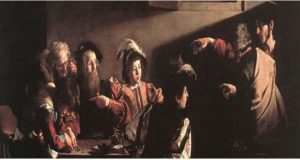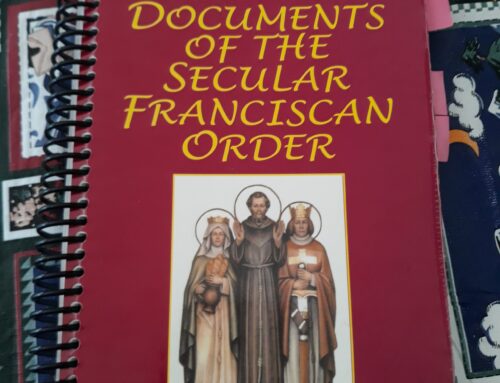 Permit me to offer in this article the “flip side” of the article “Miserando atque Eligendo.” In that article, I focused on Christ’s “looking with mercy” (miserando) on Levi, a tax collector, on our Holy Father Pope Francis and on all of us in “choosing” (eligendo) us to follow Him. In this article, I will focus on our response to our Lord’s merciful choice or election of us to “Follow me.” (Christ is on the right side of the great Caravaggio painting “The Calling of St. Matthew” above; now I will concentrate on Levi/Matthew on the left side of the painting.)
Permit me to offer in this article the “flip side” of the article “Miserando atque Eligendo.” In that article, I focused on Christ’s “looking with mercy” (miserando) on Levi, a tax collector, on our Holy Father Pope Francis and on all of us in “choosing” (eligendo) us to follow Him. In this article, I will focus on our response to our Lord’s merciful choice or election of us to “Follow me.” (Christ is on the right side of the great Caravaggio painting “The Calling of St. Matthew” above; now I will concentrate on Levi/Matthew on the left side of the painting.)
As you may recall, “Miserando atque Eligendo” is from a famous homily by St. Bede on the Call of St. Matthew in the Office of Readings for his Feast Day on September 21, and St. Bede wrote what it meant for Matthew and for us to “follow” the Lord Jesus:
“By ‘follow’ he meant not so much the movement of feet as of the heart, the carrying out of a way of life. For one who says that he lives in Christ ought himself to walk just as he walked, not to aim at earthly things, not to pursue perishable gains, but to flee base praise, to embrace willingly the contempt of all that is worldly for the sake of heavenly glory, to do good to all, to inflict injuries upon no one in bitterness, to suffer patiently those injuries that come to oneself, to ask God’s forgiveness for those who oppress, never to seek one’s own glory but always God’s, and to uphold whatever helps one love heavenly things. This is what is meant by following Christ. In this way, disregarding earthly gains, Matthew attached himself to the band of followers of One who had no riches. For the Lord himself, who outwardly called Matthew by a word, inwardly bestowed upon him the gift of an invisible impulse so that he was able to follow.”
That “gift of an invisible impulse” is the gift of sanctifying grace that Christ is ready, in His mercy, to bestow on all who, like Levi the tax collector, are ready to turn away from sin and be faithful to the Gospel.
Thus, the call to “follow me” is a call to conversion. This call to conversion is truly the Lenten call, clearly the Christian call, clearly our call as Secular Franciscans. Christ is calling all of us every day. Every day. All of us. Our very Secular Franciscan Rule 7 says “United by their vocation as ‘brothers and sisters of penance’ and motivated by the dynamic power of the gospel, let them conform their thoughts and deeds to those of Christ by means of that radical interior change which the gospel calls ‘conversion.’ Human frailty makes it necessary that this conversion be carried out daily.”
The very first words that Christ utters in the historically first written gospel are uttered to all, even before the call of the first disciples: “This is the time of fulfillment. The kingdom of God is at hand. Repent and believe in the gospel” (Mark 1:15).
And as we know from The Dogmatic Constitution of the Church, Lumen Gentium (LG), in its challenging Fifth Chapter, entitled “The Universal Call to Holiness in the Church,” that call to all, that universal call to “follow me,” is a call to holiness: “The Lord Jesus, the divine Teacher and Model of all perfection, preached holiness of life to each and every one of His disciples of every condition” (LG 40 1st Para.). “All are called to holiness” (Catechism of the Catholic Church (CCC) 2013). “All the faithful of Christ are invited to strive for the holiness and perfection of their own proper state. Indeed they have an obligation to so strive” (LG 42 5th Para.).
Okay, well, what is holiness? CCC 2028, quoting LG 40 2nd Para., reads “All Christians . . . are called to the fullness of Christian life and to the perfection of charity.” Wow! The perfection of charity. To which a quote from St. Gregory of Nyssa, brother of St. Basil, is added: “Christian perfection has but one limit, that of having none.”
There’s a worthy goal to wrap ourselves around: the perfection of charity. Let’s say it again: the perfection of charity! Now we know where we’re headed. Now we know the way to get there. Now we surely know we can’t do it on our own: be perfect in charity? We need God’s great grace. We need the help of our brothers and sisters, the help of our great Franciscan family.
We should also now know what sin is. Quite simply, sin detracts or draws us away from that perfection of charity. We are not following God; we are following our own will, our desire for pleasure, the will of the world or, worst of all, the will of the devil: “sensual lust, enticement for the eyes, and a pretentious life” (1 John 2:16). Thus, the three great works of conversion, the three great works of Lent: self-denial or fasting to combat sensual lust; charity or almsgiving to combat enticements for the eyes; and prayer or turning to God to combat the pretentious life. All lead to holiness, the perfection of charity.
If we are sincere about following Christ and committed to pursuing the perfection of charity, let us learn, almost by second nature, always to ask: is this thought being thought in charity? Are these words being formed in charity? Will these words be spoken in charity? Is this contemplated action being contemplated in charity? Will this action thus be done in charity? Will I receive this person approaching me, sitting near me, driving beside me, in charity?
Of course, to some extent, we cannot control certain basic impulses or what other people may think about us or say or do to us. Nonetheless, we can try to control how we respond to those inner impulses and to what we receive or perceive from outside. That’s when and where charity must kick in.
Again, Christ or Charity is the way. Christ or Charity is the goal. Christ or Charity should be the spark that fires our thoughts, words and deeds. If not, we run the risk of not following Christ. We run the risk of imperfection. We run the risk of sin.
One final note. A friendly Pastor once pulled me aside and gave in similar words the following “chiding” I offer to you:
“Tom, the Lord said, ‘Follow me.’ He didn’t say ‘Go out in front and show me how it should be done. I went into the desert to be tempted directly by the devil so that you would not have to go and seek the devil directly. I was hung on the Cross for the ransom of many so that you do not need to try single-handedly to sacrifice yourself for the ransom of many. I need to go first, not you. Okay?”
Moreover, Christ said ‘Follow me,’ not ‘Tom, walk here beside me.’ Yes, I may need to carry you from time to time, but you don’t need to be beside me pointing out how you don’t like how this or that is done or not done in My Church, by My bishops and priests. No, I’m not looking for an equal. I already have the Father and the Holy Spirit. I just need you to ‘follow me.’ Okay?”
Sisters and Brothers, let us pray for one another that we may be given the grace to follow wherever Christ chooses to lead us.
Reflection Questions
- With what part of our bodies should we start with when we try to obey the Lord’s call to “follow me”? Whose help do we always need to answer this call?
- How is the Lord’s call to “follow me” a call to conversion? What other call does the Lord make to conversion in the Gospels?
- What are the exact words of our Secular Franciscan Rule 7?
- How is the Lord’s call to “follow me” a call to holiness? What is your personal definition of holiness?
- And what is your personal definition of sin? How do we avoid our own personal sins?
- In what ways is the Lord’s call to “follow me” NOT a call to go in front?
- In what ways is the Lord’s call to “follow me” NOT a call to walk side by side?
This is an excerpt from a series of articles by the late Deacon Tom Bello, OFS, former Minister of the National Secular Franciscan Order – USA. “Many of these essays were originally published in TAU-USA, our national newsletter,” said Jan Parker, OFS, current National Minister. “They are excellent for reflection and ongoing formation.” Jan helped Tom publish these essays in book form. It is called For All The Saints: St. Francis’s Five-Point Plan for Salvation and is available from Tau Publishing. These excerpts will appear several times a week on the Secular Franciscans website.



Leave A Comment